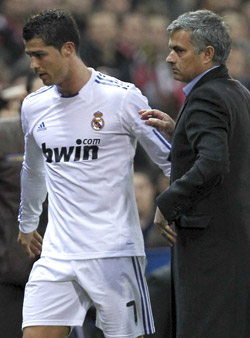REFS DO NOT FOLLOW PROTOCOL AND DO NOT MENTION SHOUTS FROM THE STANDS IN THEIR MATCH REPORTS
Text by: José Félix Díaz
El Confidencial Sports
3/22/2011
Real Madrid's Cristiano Ronaldo and Jose Mourinho, last Saturday
Open season. Anything goes in sports, or rather in soccer. If you’ve had a bad week, they fired you from your job, or you argued with your husband or wife, there is a solution. What’s more, it’s free. The solution is simple. Buy a ticket for a soccer game and you can insult, scream, and wish death upon whoever you want with no extra charge.
While we were hypocritically shocked at the death of a San Lorenzo fan in Buenos Aires, in Spain we attend a parade of performances from uncivilized people who turn up at stadiums to hurl insults without consequence, the first step to more serious actions. What happened in the Vicente Calderón stadium when a section of the stands wished death upon Mourinho and Ronaldo, and called Marcelo a monkey, went unnoticed. They fell on deaf ears, as happened in the previous encounter Atlético and Real Madrid, in the Copa del Rey. No one reacted and the worst of it all is that it doesn’t look like anyone will.
The first people who can act on the shouts and insults coming from the stands are the referees. The directors of the Federation told the referees that they should reflect in their reports any sort of insult, whether racist or not, that is produced during a game. They were ignored. Texeira Witiens must have been the only person in the Calderón who didn’t hear the chants and disparaging comments from the crowd. To date, no club has been sanctioned by the Competition Committee of the Federation for similar situations. It is a chain reaction. The referees don’t report it and Competition doesn’t punish it.
Sources from the Federation spoken to by El Confidencial think all that will change when a referee, by his own decision or that of a player, suspends a game for the insults coming from the crowd. There are not many referees who dare to put any sort of mention in their report. Pino Zamorano, in the Second Division, dared to do it in a game between Betis and Cartagena last season. Ramirez Domínguez also reported the shouts in a game between Mallorca and Barcelona, which targeted Yayá Touré.
Eto’o’s Precedent
Samuel Eto’o is one of the few players who has taken a stand against racist insults. In a game against Zaragoza, the Cameroonian decided to walk off after repeated shouts from the stands imitating a gorilla. Only the intervention of his Barcelona teammates stopped him from leaving the field mid-game. History repeated itself last season with Eto’o at Inter. It happened in Cagliari, and the game was suspended for three minutes. What’s more, a judge decided to close the ultra section of Juventus for shouting racist insults at Balotelli in 2009. Just like in Spain.
The Sports Council, directed by Jaime Lissavetzky, approved the Law Against Violence and Xenophobia in Sports in July of 2007. The problem is that it is not applied, at least not as it is intended to be. The law allows referees to suspend any sort of athletic event where there are racist insults or insults against the honor of the athletes or officials. It considers as well fines ranging from 150 to 600,000 Euros or even prison. Also, obviously, prohibition from attending any sports arena. What happens is that if there is no report, there is no possibility for punishment.
The Antiviolence Commission has proposed punishments for fans or clubs who do not follow the regulations, but always after police reports. Now the question is clear: Why does soccer look the other way? In basketball, there have already been games stopped for insults against the officials. They needed no more reason.
The curious thing is that the players are working to show their solidarity. Just yesterday, Keita, Piqué, and Messi participated in a UNESCO video against racism, just like Real Madrid, Valencia, Sevilla, and Atlético players have done in the past. The problem is that the message doesn’t reach the stands or the more radical fans.










0 comentarios:
Publicar un comentario